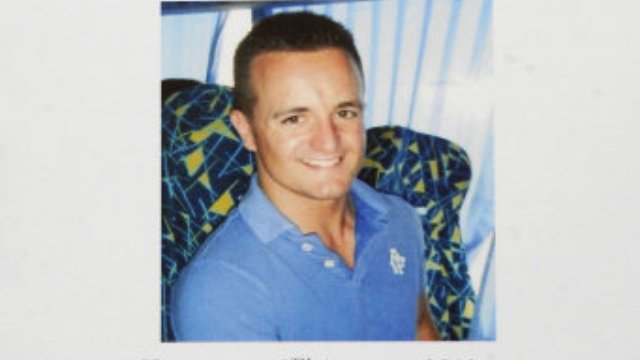Men Cleared Of Negligence Of Former Leicester Uni Student
18 September 2018, 16:31 | Updated: 18 September 2018, 16:38

Two men responsible for the safety of a former Leicester Uni student, who died after an SAS training exercise, have been cleared of negligence.
Lance Corporal Craig Roberts died from heatstroke, along with 2 other reservists, after trekking the Brecon Beacons on one of the hottest days in 2013.
The men, known only as 1A and 1B, denied the allegation that they failed to take reasonable care for the health and safety of candidates
Corporal James Dunsby died at Birmingham's Queen Elizabeth Hospital from multiple organ failure more than two weeks later.
1A and 1B, whose identities are protected by an anonymity order, went on trial at the Court Martial Centre in Bulford, Wiltshire, last Monday.
The servicemen, who were the safety officers for the march, were acquitted by a five-person board on the direction of Jeff Blackett, Judge Advocate General.
Following the deaths, a number of inquiries identified systemic failures but prosecutors alleged that the defendants' had committed fundamental and basic errors on a personal error.
But Judge Blackett found that their lack of training on heat illness and risk assessments meant that other servicemen in their position would not have acted differently.
"I have determined that there is no evidence of negligent performance of duty when the conduct of these defendants is measured against the reasonable serviceman of similar experience, knowledge and training," he said.
"A board properly directed could not properly convict and I intend to stop the case now."
Prosecuting, Louis Mably QC said he would not seek leave to appeal the judge's decision that the defendants had no case to answer.
Judge Blackett told the families of the three reservists: "You may have thought that this trial might have helped you obtain some degree of closure.
"But this trial was never about attaching sole blame for the deaths of these three young men on these defendants.
"The allegations of negligent performance of duty were only a small part in the overall failings - the deaths occurred because of the systemic failures within Joint Forces Command.
"Of course, the system is made up of people but there have been successive people in A-Block and within the chain of command who have failed to address their minds to the real risks involved in exercising in extreme temperatures, and who have failed to ensure that those delivering the training or invigilating the test were properly trained in all aspects.
"These two defendants did the best they could in the circumstances of fewer resources than requested, a lack of even the most basic training in relation to heat illness and risk assessment, and within the culture that existed at the time."
The judge said the defendants were in charge of a test march for candidates wishing to be selected for "one of the most, if not the most, elite military units in the world".
Following the deaths, the Health and Safety Executive issued a Crown censure to the Ministry of Defence (Joint Forces Command), which is immune from prosecution.
"The HSE had concluded that there were serious failings in the planning, assessment conduct and monitoring of the test week, which were causative of the deaths and ill health suffered," Judge Blackett said.
"The MoD has accepted that there were systemic failures."
The judge said there was no evidence on what the defendants could and should have done differently in relation to the selection march.
He added: "Given the type and intensity of this exercise, it is clear that the reasonable serviceman in the defendants' position would not have stopped the exercise in similar circumstances."
Speaking outside court, Bryher Dunsby said she still missed her husband, Corporal Dunsby, every day.
"This court martial has revealed the shocking reality that there is still no official guidance for those conducting endurance training marches in the British Army on heat illness even five years on," Mrs Dunsby said.
"This is beyond unacceptable, and shows blatant ignorance to a vital need where apparently three deaths are not enough to incite change.
"Nothing highlights this more than since the inquest in 2015, there have been yet further incidents from heat in training, even on Brecon."
Mrs Dunsby continued: "I now call upon the head of our British Army, the newly appointed Chief of Staff Mark Carleton-Smith... to prioritise and put extra resources behind completing and implementing the new guidelines and directives for endurance marches and heat illness.
"This would ensure that those running training have clear and direct orders to follow from the top of the chain of command. And I am asking him to tell me when this is done."
Mrs Dunsby said: "We all grow up with the national narrative that our SAS, quite rightly, are our elite and some of the best in the world, something we are very proud of here in the UK.
"If we are to continue this level of excellence in a global arena, where defence provision is increasingly fundamental to our national security, more defence funding, progressive thinking and competent quality leadership must be prioritised.
"Ensuring the training of our forces is run efficiently and safely is non negotiable, particularly when we are asking our service personal to push themselves to the ends of their endurance.
"I want to be clear that I am not suggesting that any part of Special Forces selection should be made easier - what I am saying is that there is a greater need to track, monitor and asses students more and not less when the risks are so high."
She called for trainers such as 1A and 1B to be given flexibility and permission to react and respond, particularly to changes in the weather.
Mrs Dunsby described the work of the Health and Safety Executive as "essential", saying they were the only external organisation allowed to scrutinise the MoD.
"The MoD are still protected from prosecution for corporate manslaughter by Crown Immunity, there is an obvious need for this in live combat but I believe not in training in Wales," she said.
"Without ultimate accountability or punishment from the law, there is no incentive to do the right thing.
"Just because there is no one watching, this should not absolve the MoD from maintaining best practice or leading in excellence within their field as a training organisation deserving of our service personnel."
She said her wish was to see new heat guidance "urgently completed" to ensure a positive legacy for the three reservists who died and to protect lives in the future.
Lewis Cherry, representing 1A and 1B, said outside court: "The defendants have always maintained that they did their duty diligently and conscientiously and they have now been vindicated.
"This test was conducted to standards set by a higher authority that could not be changed by them.
"It had been run this way for many years by them and others without criticism from their chain of command.
"The evidence heard during the case was that both of these men were diligent and thorough and that nobody else in this organisation did or would have done anything differently."
Mr Cherry said the defendants "did their best" to provide a safe test system and attempted to stop a march the day after the deaths but were overruled.
"They again express their condolences to the families of the three servicemen," Mr Cherry added.
Clare Stevens, who represented Cpl Dunsby's father at the inquest and L/Cpl Roberts' following the inquest, said: "The failings were significant and went right to the top - the two put on trial are scapegoats for those at the top.
"Those that should have been on trial weren't.
"The MoD is immune from prosecution under health and safety legislation, so it received a Crown censure - just a recording to confirm had they not been exempt from prosecution, they would have been prosecuted.
"That is simply not good enough. If we look at the MoD's health and safety record, it suggests that they have a cavalier attitude to the safety of their men and women, in particular the assessment and management of risk.
"Until they are held properly accountable, there is no impetus to change. The MoD constantly claims to have learnt lessons, but there is no evidence of that."
Heat illness prevention management guides have been updated three times since the march in 2013 and are now "embedded" in the training culture, the Army said.
"Our thoughts remain with the families and friends of Cpl James Dunsby, LCpl Craig Roberts and Tpr Edward Maher at this difficult time," a spokeswoman said.
"The safety and wellbeing of our personnel remains our top priority and following these tragic events we have made a number of changes, particularly in relation to heat stress and training, to ensure an incident like this does not happen again."
The Army is continuing to conduct research into the effects of heat illness to ensure training "meets the very highest medical standards", she added.






